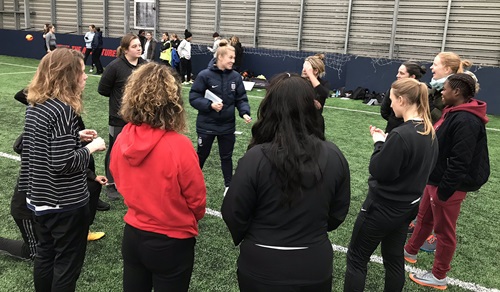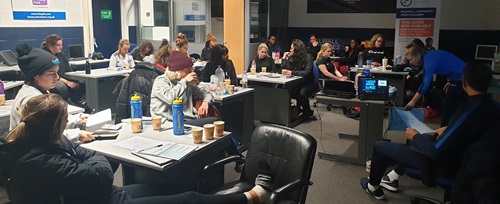
100FC Is Important – And Here Is Why...
In the summer of 2019, London, Middlesex and Amateur FAs launched 100FC.
100FC’s purpose is to address The Football Association’s aim to increase ‘the number and diversity of women coaching, refereeing and administering the sport at all levels’ to support and assist the growth of women’s football. It is a free coaching programme, which is funded by Wembley National Stadium Trust. 100 female coaches aged 16+ are provided each year with support through inspirational coaching mentors and tutors such as Emily Hill, Katie Phillipson and David Streetley (AKA Streets), and the opportunity to obtain their Level 1 and 2 coaching badges.
The programme also provides coaching placements at a range of different clubs (from elite development squads to wildcats). 100FC addresses the barriers that many prospective coaches may feel have hindered them – cost and opportunity.
It’s a proactive approach. With Baroness Sue Campbell recently conceding that there is a lack of coaches to adequately support the recent growth in women’s football, this programme is even more important. Coaches are needed to support this properly and encourage a safe and fun environment where learning takes place.
My Journey
The first time I considered coaching was the 10 September 2018. I know the exact date because I received an email from the secretary of my university football team about a refereeing course. I didn’t take her up on that offer. However, it did make me consider football coaching. Coaching football was one way to share my love of sports and to encourage girls and women, who might have felt apprehensive about being involved, to get involved. As a medical student, being able to encourage participation in sport through coaching was important to me from a public health perspective too.

A year later, I found out about 100FC and the rest is history. I’m now nearly five months in and I have a Level 1 certificate, a lot more knowledge than I had in the beginning and a whole lot more learning left to do, which is exciting.
Stepping into my first 100FC session was a bit nerve-wracking. I’m pretty sure I was just on time – the Arsenal hub is tricky to find! The nerves disappeared because I quickly realised everyone was in the same boat. Everyone was new to this and trying to figure it out. The great thing about 100FC is that you figure out how to coach together, with the help of amazing Coach Mentors who teach you about the importance of empowering players. The best thing about 100FC is the community of coaches that you become a part of. It is a diverse community of coaches who help each other out and learn and grow together. It’s a melting pot of people – students, mothers, civil servants, retirees, even Coronation Streets fans! Everyone has different motivations for getting involved. Some people have played football all their lives and want to pass on that love of the sport. Some have never played football and want to try something new. Some people have children who play football at a club and want to help out there. Some people see this as the very start on a long journey to their UEFA pro licence. The power that exists in this diversity manifests itself in different viewpoints and perspectives, which give rise to the creation and exchange of some amazingly creative ideas. Learning in the classroom was pretty fun but starting my placement may have been my favourite part of 100FC.
Independently, placements can be difficult. It can be hard figuring out who to speak to and how to negotiate a schedule that suits you. 100FC makes it super easy to find a placement that suits you. My placement is in West London on Saturday mornings and that’s ideal for me because it doesn’t clash with my university lectures and it’s close enough to where I live. The best bit about placement is just getting stuck in and putting the lessons that you’ve learnt into practice. I’ve been trying new ideas and failing, adapting them and trying them again. Honestly, it’s been fun.

I remember asking the girls after the match how they felt about the match. They were tired, understandably, but they had fun running around the pitch with their friends. Football should be fun. It’s how we keep people playing football. They also spoke about what they did well, what they didn’t do so well, and how they may be able to solve some of the problems they faced next time. They were so animated and it was great to see! That was one of the most important lessons that I learnt from my coach mentors. Empowering your players is so key, and sometimes as a coach, it can be really easy to impose your views on players, but it’s vital to listen to your players.
100FC is important. It’s important for those who play because training coaches means that players are adequately supported. It’s also an important programme for coaches because the support you receive from coach mentors, new friends and clubs and the opportunities you receive are in a class of their own. It’s a programme that’s been successful in London and should be rolled out around the country because after all, football exists outside London.
Read more football content on Adannaya’s blog adannayajohnsonnwosu.wordpress.com or her Twitter @ajohnsonnwosu








